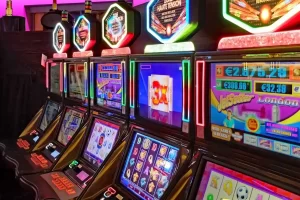
Exploring the Psychology of Slot Machine Addiction
Gambling can quickly become a compelling form of entertainment and become an addiction for some individuals. Understanding the psychology behind slot machine addiction is crucial in order to prevent or assist those already affected by it.
One study concluded that participants suffering from depression experienced a deeper positive feeling while gambling due to dark flow – an immersive state wherein one loses track of time and money while fully immersing oneself into their game.
The reward system
The reward system consists of neural structures responsible for incentive salience, associative learning and positive emotions. It influences many forms of behavior including gambling addiction. For some individuals, winning can bring enough pleasure and excitement that their gambling habit continues unchecked – leaving responsibilities aside while gambling takes priority over them.
Anxiety about winning can trigger dopamine receptors in your brain and create feelings of pleasure and excitement, stimulating ventral striatum (the area responsible for reward-seeking behavior). Slot machines are specifically designed to trigger this activation process so they keep players coming back for more!
Individuals addicted to slot machines may seek relief through therapy and environmental modification. Family, friends and self-help groups such as Gamblers Anonymous may provide much-needed support. Medication may also be prescribed alongside therapy in order to treat any underlying depression or anxiety which might be contributing to their addiction.
The environment
Environment plays an essential role in the formation of gambling addiction. Such influences include family and peer influences, availability of gambling opportunities and attitudes about gambling within society. While all forms of gambling can become addictive over time, electronic gaming machines carry particular risk for addiction as they activate brain reward systems to increase dopamine levels creating pleasurable sensations which lead to psychological addictions.
Gambling issues have long been associated with mental health conditions like depression and anxiety. People suffering from these disorders often gamble to reduce stress or alleviate negative moods. Stealing money or valuables to fund their gambling habit may also contribute. Such actions often leave family and friends feeling betrayed and mistrustful of those involved with addiction.
No matter its cause, it’s crucial to recognize the warning signs of gambling addiction and seek assistance. Therapists can teach healthy coping mechanisms to manage stress and avoid triggers for gambling; additionally they provide family therapy sessions, marriage and career counselling as well as credit and financial management advice.
The technology
Modern slot machines — those featuring video screens and buttons instead of mechanical reels — account for three quarters of casino revenue and can be highly addictive; one study showed that those playing slots became hooked much quicker than those who played cards or placed sports bets.
Psychologically speaking, one of the things that draws players to slot machines is their allure: an “illusion of control”. Near-misses and feeling that you can influence a game of chance keep players hooked enough that they’ll keep dropping money into machines in pursuit of winning spins.
Gambling addiction can lead to many serious consequences for those struggling, including financial debt, problems in personal relationships and work difficulties, involvement with criminal activities to support their habit, as well as lying to loved ones about losses to cover up losses; all of which could eventually result in bankruptcy or marital separation.
The social aspect
Gambling can be an entertaining form of entertainment, but it can have serious repercussions for individuals. Understanding the signs of slot machine addiction is crucial for individuals attempting to identify and seek treatment before it becomes a serious problem. By being aware of warning signs, altering environments, regulating technology use and seeking support services individuals may overcome their slot machine addiction and successfully move on with life.
Schull notes that one of the primary motivations behind slot machine addiction is their “zone,” an altered state where their attention becomes so consumed with playing that they lose track of time and their other obligations, like caring for children or eating. She has witnessed players so immersed in their gaming that they leave their children unattended in cars, wet themselves while gambling, or forget to eat for hours on end!
Recovering from gambling addiction requires rebuilding relationships with loved ones. Individuals often lie and manipulate to fund their habit, which can wreak havoc with relationships. Rebuilding these bonds may prove challenging but is nonetheless achievable – you just need the courage to overcome this addiction!



Average Rating